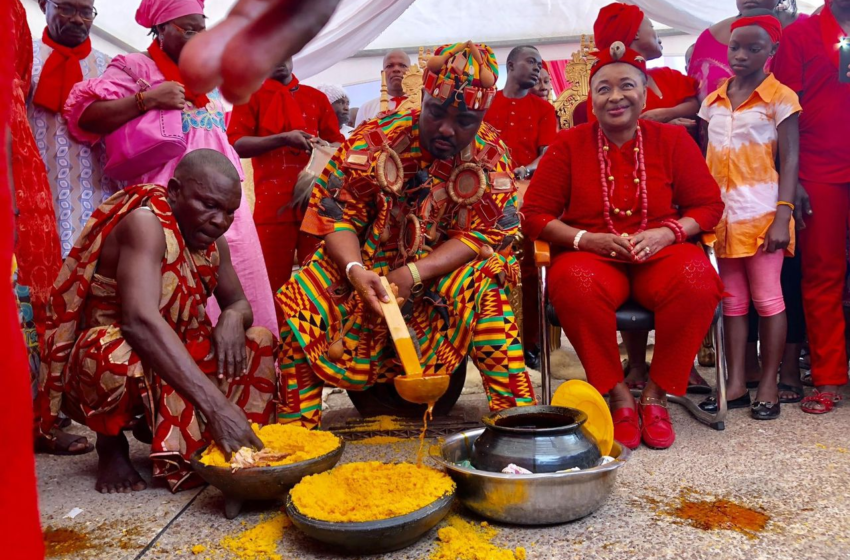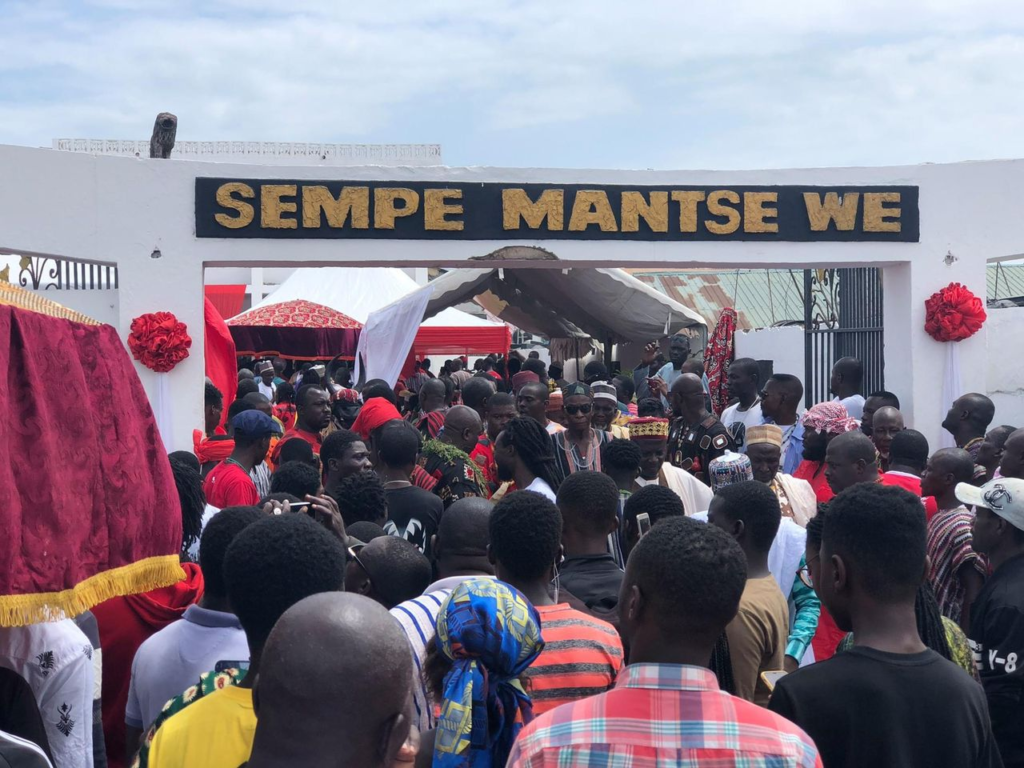THE GA HOMOWO FESTIVAL 2

The Native Year starts from Sunday, the day following the feast, which must be on a Saturday. The reckoning of the year is made either by days or weeks from the first day set down by the Dantu Priest as the first day of the Native Year.
Sometimes, either in the middle of the year or towards the end, the Dantu Priest will put the Calendar either forward or backward for a week or two. This will be done by order of the Ga Mantse or by the Dantu Priest himself for no assigned reason. Hence the Calendar is not stationary, and the times of the Homowo Festival vary.
The celebration usually takes place in August, rarely in July or September. It is believed that the whole of Accra celebrated the Homowo Festival in 1888 as late as the 27th or 29th of September.’
The following are some of the fixtures of the Native Year

1st Day, Monday: The first day of the Ga year is reckoned from the first Monday after the Saturday feast. The reason for the present two feast days has already been given.
The Dantu Priest reckons the days for the Native Year from the first Monday, since it is bad to start on the Saturday, which is unpropitious.
This day the Dantu Priest celebrates his Grand Custom by feasting and making certain concoctions of leaves in a native bowl, out of which all the adherents and the family of the Damte Dsanwe people take drops of water with the leaves and sprinkle themselves with the water. The Damte Dsanwe people will also visit each other throughout this day.
2nd Day, Tuesday: The whole of. Accra start to prepare for the general Homowo Harvest Festival, no fisherman goes fishing, and in some parts of the country no farmer works on this day.
This day is supposed to be most unpropitious, -and there fore many natives undertake nothing of importance on this day. Preparation for the general Harvest Festival continues, and general merriment by the Damte Dsanwe people.
3rd Day, Wednesday: -This day is supposed to be most unpropitious, and therefore nothing of importance is undertaken.

4th Day, Thursday: -No farmer works, and in some parts of the country no farmer is allowed by Native Law and Custom even to scratch the surface of the land. The preparation for the general Harvest Festival Custom and Harvest for the whole of the Akras.
5th Day, Friday: This is a general day for farmers to rest, and Native Law and Custom allow no farmer to do work of any kind.
6th Day, Saturday: -Nothing of much importance really takes place from this Saturday until Thursday, the 11th day.
11th Day, Thursday -All the people in the villages and towns outside come to Accra Town for the Homowo Festival. In the evening of this day a gong is beaten declaring that
No one is allowed to demand a debt till after the Homowo or Harvest Festival.
No summons will be taken against anyone before any Mantse, and no oath sworn will be entertained by any Stool holder till the Homowo season is over.
No one is to make or lay any claim against any person or persons till the celebration days of the Harvest Festival are over.
The penalties for the breach of any of these injunctions are then set forth.

It is stated that when some years ago a man brought about a Civil War on Sunday, 14th day of the Native Year, he was executed by the order of the Native Authorities of the whole town of Accra, being drowned in the sea; and that his act was considered punishable as a crime under the Native-Law and Custom, viz., the infringement of this proclamation or oath.
Rev. Carl Reindorf in his history of the Gold Coast and Ashanti gave the facts and history of this matter.
On this same night guns are let off either to drive away the ghosts which had occupied some of the houses during the absence of the bush people in their towns and villages, or to keep in order those ghosts which had come down from the bush towns and villages to observe the Harvest Festivals; possibly also to give notice to the ghosts that their people had come down to or from the bush. Presents of clothing, etc., to children and other relations and connections start to be given from this day.
12th day, Friday : This is the day before the Saturday on which all the Accra people celebrate the Homowo or Harvest Festival.
It is on this day that sons-in-law make presents of pieces of firewood to their father-in-law for the customary yearly gift, and daughters-in-law make presents of bundles of firewood to their mothers-in-law according to custom for yearly gift.
These presents are symbols of service annually performed for their fathers-in-law and mothers-in-law in days gone by. On this day also good and intimate friends make gifts of pieces of firewood to their friends. On this day alone people go to Akpade Gonno at Mkpono on the western slope of the hill, on which is situated Amankorobi, the burial place of the late Ga Mantse Tackie Tawia.
On this day every year the Korle Priest puts down palm leaves or “Gofi” at three points on the road leading into the Korle Lagoon, thereby closing the road and stopping people from going to fish in the waters. Nobody is allowed to pass by on that road until the “Gofi” is taken away.
Before putting “Gofi” down the-Korle Priest offers .prayers thus:
“Nmene soha ne aba tsi ona, ni aba tsi ona ne, nu dsio yo dsio ni eba dse nwane ni eba ko ya ni efo ye ottili le,lo eba wu ye omli le, kedsi egbo le dsee moko hesaneko; ble mole ledientse esumo egbele”
This translates into English as
” To-day Friday I come to stop people from fishing in you,and if anyone contrary to this injunction were to come to fish privately,or have his bath here,he is to die: this will be nobody’s fault hut his own.”
When the time of taking off the “Gofi” arrives a number of people accompany the Priest carrying fishing nets, and at the actual removal prayers are offered again. Some of the fish are distributed among the Mantsemei and other principal people in the town. This distribution of fish is known as ” Didei Kome Ake Yeo Ko”

The Ga Mantsemei and other native chiefs and people now cook the fish with kpokpoi the festive food which they scatter little by little on the ground on the feast day for the old people who died long since to come and partake of; moreover those who died lately are supposed to enjoy what remains.
When the people and Korle Priest go down to the Lagoon to open it, the Priest commences by making the following libations and prayers to the fetish – that is, the spirit in the Korle Lagoon.
“Awo !Awo !Awo !Nmene soha ne bodientse ogbi ona tsii nii le aba dsie ye ona,ni bii ke hoi le aba mo onmon aha bo,wo ye musun ekoo wo wo yitso gbawo. “
In English:
” May the Gods be praised and their blessing be upon us;this Friday is your own day;the things that were placed here as signs for closing fishing in you are going to be removed, so that children and other people may come and fish in you,and when we eat of the fish, may we have no headache or stomach troubles or other illness.”
After this prayer the Priest will pour rum on the ground from his native cup and then say:
Tswa ! Tswa! Omanye Aba (“May the Gods bless what we are doing”; and those who stand will answer, ” Hiao! (“May it be so!”)
The Priest then casts a net into the Lagoon three times as a sign of fishing, but without fishing, so signifying that the restriction is removed. After the third time, the Priest hands the net to one of those standing by, who starts the fishing casting the net three times according to directions by the Fetish Priest; then all the people follow into the Lagoon for, fishing.
The man who performed the first fishing act after the Korle Priest in 1918 was a brother of Obili Kwaku, the ex-Ga Mantse called Ayi Kofi.
The Priest then pours rum upon the bank of the river at the three points where the palm leaves are placed before removing them. He informs all the chiefs and priests when going, and will give some of the fish which he gets from the Lagoon to the other priests and the Ga Mantsemei and the principal people to use for preparing their meals for the festival, and they each provide a flask of rum for their own compan
The Lagoon is closed and opened three times in the year. When the fishing is to be closed a long stick is first put on the ground and a palm-leaf fixed on it, and the Priest speaks thus to the spirit which is in the Korle Lagoon: –
“Nmene soha ne aba tsi ona,aba tsi ona ne nu dsio, yo dsio,ni aba dse nwane ni aba fo ya ni efio omli le,’ke egbo le dsee moko gbe le.”
This translates into English thus :
“On this Friday when fishing in you in being closed,if any man or woman who in doubt or out of want of faith or belief,in what is being done, shall come and fish in you, if he or she dies, no-one is responsible but the, person trespassing alone”
The Priest then fixes the palm leaves on the stick in the ground and pours rum on it, first saying: ” Awo, awo, awo.” This is done in three places. The palm leaves for closing fishing are placed in the Korle Lagoon and also in that part of the mouth of the river where it passes into the sea.
The Korle Lagoon is closed for fishing on the eighth week after the Ga-general Homowo: this occurred on October 11 in 1918. – The Lagoon is opened again on the Friday immediately preceding New Year’s Eve.
Fishing is now resumed for a period of four, five or six weeks. It is then closed for the ceremony of clearing the ground for Guinea Corn. A week later it is opened, Priest and people going-round the town. The Priest now collects the tolls 0f fish from those who fish in the stream or lagoon. Three weeks later the Guinea Corn is planted and the fishing season ends until the corn is established, say four weeks later, when the fishing grounds are thrown open once more. There is a sort of quarry near which women who died of child-birth were taken and left on the ground exposed to the elements on the order of or according to the rule of the Oyeadu Fetish.
In this is found a sort of red swish, which the people used to bring to town both on this twelfth day and the preceding Thursday; water is put into it, and with this liquid the doors and gate fronts are plastered. This is the day when the Abam Custom comes to an end and all the family Yam Customs are performed for the last
13th day, Saturday: This is now the great day for Akras; on this day, the great feast takes place for which they prepare palm soup and kpokpoi
14th day, Sunday -Visits are paid on this day; this is the Sunday after the Harvest Festival day.
The people used to get up early in the morning and start crying for those who have died and gone, some of whom they do not know, even by name. This is the day for Ngowura, when people go from ‘house to house to their friends and relatives wishing them good luck, prosperity and long life in the New Year. This is the day when all long-standing disputes are settled and put aside and the parties have a good drink over it all.
Source: A.B. Quartey-Papafio.




